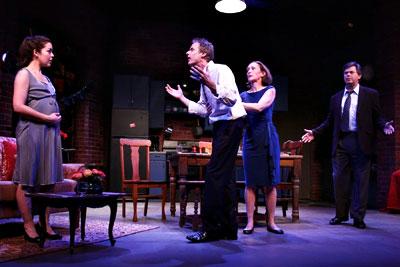Career, Morals, and Love

The second production in the Hampton Theatre Company’s seasonal lineup proves to be as different as can be from the first. “Harvey” was a classic comedy, a tale of fuzzy humanity and warmth. “Time Stands Still,” another powerful work by the Pulitzer Prize-winner Donald Margulies, is a commentary on war, relationships, and the tragically intellectual.
The play has just four characters. At the forefront is Sarah Goodwin, a conflicted war photojournalist who has just returned from a hospital in Europe after nearly being killed in Iraq. With her is her longtime partner, Jamie Dodd, a reporter who was with her on the frontlines at first, but had to leave the Middle East before her accident, which is explained as the play progresses.
Richard Ehrlich, the couple’s editor and confidant, arrives on the scene with his new girlfriend in tow. Mandy, noticeably younger than the other three, is guileless and kind, but also defies ditziness in a formidable way. It’s interesting that Mr. Margulies chose to leave Mandy without a last name -— she is simply Mandy.
From the beginning, the relationship between Jamie and Sarah is tenuous. The pair are skating on thin ice, with visible cracks of P.T.S.D., guilt, and remorse running through it, while they try to settle into the vagaries of daily existence as Sarah heals, at least physically. Richard and Mandy, so touchy, so feely, so obviously in love in spite of the differences in their ages and backgrounds, set up a stark contrast to the lead characters.
Halfway through the first act, the issue comes forth: Is a photographer chronicling atrocities actually making a difference? Mandy recalls a TV show depicting a baby elephant dying while trying to get to his mother through a sandstorm, and displays her grief and anger at the film crew for not helping when they could easily have done so. And later, the foursome discuss a play they have just seen about the Middle East; Jamie disdains the audience for its fake concern and real guilt over the horrors taking place in Baghdad, Kabul, and beyond.
But this is not a play about the horrors of war. It’s about relationships, particularly one that has been forged on the battlefields, part social-consciousness, part adrenalin. After decades of swallowing the most unimaginable of events, how simple is it to switch gears and start to talk about TV shows, weddings, and babies?
As Sarah, Sandy York brings a necessary immutable strength to the stage. It is clear that her heart is still by the side of the road, and that she must maintain her illusion of control at all costs. Similarly, John Carlin portrays Jamie with a mix of appreciation for the experiences he’s had, guilt over his own shortcomings, and a genuine desire to move forward. Writing about horror movies, although not as exciting as bombs bursting overhead, is as close as he wants to get to another dose of gore.
John L. Payne as Richard Ehrlich offers his two star employees a father figure: best friend, boss, and adviser all rolled into one. He has chosen to keep it simple, at the expense of intellectualism. “Fuck brilliant,” Richard says, alluding to a former flame. “Choosing where to go out to eat was like arbitration.” He is done with debate. Mr. Payne plays Richard as a man who has been given another chance at midlife to create something lasting and of value, and is truly happy.
And then there’s Mandy-with-no-last-name. Although the audience may expect an archetypal idiot, that is not who she is. Kate Kenney treads a careful line; Mandy knows she is in the presence of greatness, but is not afraid to offer her own opinion. Her bounciness knows no bounds, and it is contagious. Much of the comedic moments of the evening come from Ms. Kenney’s portrayal.
As always, the production at Quogue is professionally staged. Sean Marbury’s vision of a bricked loft in Williamsburg is perfect, Teresa LeBrun’s costumes reflect the characters they cloak, Sebastian Paczynski’s lighting helps set the tone for each scene. Sarah Hunnewell uses the space to its best and highest advantage.
Like a photograph, “Time Stands Still” captures a fleeting moment in the lives of four people at an intersection of career, morals, and love. Who will move on and who will not? See for yourself at the Hampton Theatre Company in Quogue.
